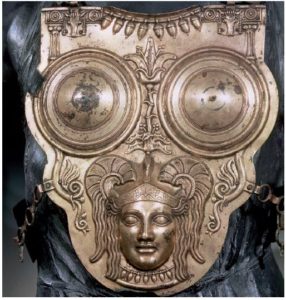Cato Demands Carthaginian Hostages At The Banquet:
Gaius Antonius landed in Carthage a week later and came ashore with Lavinia’s Uncle Cato. The colorful buildings were crowded together in the harbor touching side to side with hardly a space in between. Around them flourished small gardens. He could pick out brightly colored red hisbiscus and flaming pink bougainvillea.
They were taken to one of the most opulent houses. The head of the city received their all Roman delegation in high style. Servants raced around them to serve them an impromptu banquet.
As they were seated at a banquet he heard strange music and the sound of mourning people. Cato gave him the eye as they watched the citizens parade in a group towards a religious temple not far away. It rose over the harbor. He had been tutoring Gaius before they set out in the customs of the Carthaginian people and their history.
He had informed Gaius that they practiced a horrible, primitive religion that demanded sacrifices of baby infants to the God Cronus. Cato had showed Gaius ugly images of this repulsive God with his hands extended palms up and sloping towards the ground. The children were placed in those arms. They fell into a gaping, fiery pit. Then they were buried in a special cemetery devoted to that purpose.
If Gaius had any qualms about coming down hard on the Carthaginians he lost it after experiencing this horror. These people were not worthy to survive. Their customs, their religion, their culture seemed blackened because of this crime.
The leader of the Carthaginians pleaded as they progressed with the banquet, “I don’t understand what the problem is.” And he addressed Cato in good Latin, abandoning the Phoenician language out of deference, for the Carthaginians had always been a seafaring people. “Our neighbors attacked us. I assume we have the right to defend ourselves.”
Cato slapped down a copy of the treaty that had ended the last war against Carthage. It had almost ended with the destruction of Rome except for the generalship of Scipio Africanus.
“You agreed not to move your armies outside your city state without our express permission,” Cato pointed to the exact provision.
Everyone at the banquet cast him alarmed expressions.
“Very good, sir,” the leader of the Carthaginians tried to wax diplomatic as he wrung his hands. “But we thought that meant major wars of aggression. We did not think it had to do with raiding and more minor infractions of our neighbors. Rome is too far away to consult about matters of the moment like that.”
“The provision is literal,” Cato glowered at him worse than he glowered at senators in the Senate House. Gaius could see all the men in the room cringing. “We must consent to every act of aggression no matter how small or insignificant. How else can we protect ourselves? We don’t know what you might try next.”
The leader threw up his arms. “From now on we will try to obey your wishes in the matter. But you must excuse us this time. If we had not acted, we would not now have a fishing fleet. Then we would starve.”
Cato shook his head. “I must demand more. As a surety of your good behavior over the next year, we want as hostages one hundred of your noble youths to take with us back to Rome.”
Silence descended upon the banquet hall as the Carthaginian leaders exchanged haunted looks. They retired from the banquet into an adjoining chamber to discuss the matter of the hostages in detail and in privacy.
Cato nodded at Gaius. He took advantage of the opportunity to sketch the meeting place in detail just as he had already sketched the harbor works, the houses grouped together, and the flowering plants placed just so. It was a way to relieve the tension of waiting.
Cato did not look tense. He did not think the Carthaginians had any choice but to placate Rome with hostages. And he intended to exploit his position for everything that it was worth.
There was a commotion and a stir in the banquet room. Whisperings could be heard. Suddenly the leaders of the community burst through doors in the back of the room. Gaius gazed into their eyes the way Cato had taught him. The answer concerning the hostages was on their lips.
